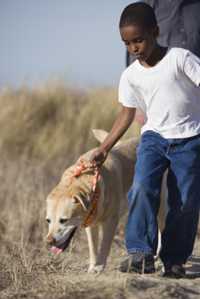Animals (Zoonotic)

Pets can carry parasites and pass parasites to people. Proper handwashing can greatly reduce risk.
A zoonotic disease is a disease spread between animals and people. Zoonotic diseases can be caused by viruses, bacteria, parasites, and fungi. Some of these diseases are very common. For zoonotic diseases that are caused by parasites, the types of symptoms and signs can be different depending on the parasite and the person. Sometimes people with zoonotic infections can be very sick but some people have no symptoms and do not ever get sick. Other people may have symptoms such as diarrhea, muscle aches, and fever.
Foods can be the source for some zoonotic infection when animals such as cows and pigs are infected with parasites such as Cryptosporidium or Trichinella. People can acquire cryptosporidiosis if they accidentally swallow food or water that is contaminated by stool from infected animals. For example, this can happen when orchards or water sources are near cow pastures and people consume the fruit without proper washing or drink untreated water. People can acquire trichinellosis by ingesting undercooked or raw meat from bear, boar, or domestic pigs that are infected with the Trichinella parasite.
Pets can carry and pass parasites to people.
Some dog and cat parasites can infect people. Young animals, such as puppies and kittens, are more likely to be infected with roundworms and hookworms.
Wild animals can also be infected with parasites that can infect people. For example, people can be infected by the raccoon parasite Baylisascaris if they accidentally swallow soil that is contaminated with infected raccoon feces.

Regular veterinary care will protect your pet and your family.
There are simple steps you can take to protect yourself and your family from zoonotic diseases caused by parasites.
- Make sure your pet is under a veterinarian's care to help protect your pet and your family from possible parasite infections.
- Practice the four Ps: Pick up Pet Poop Promptly, and dispose of properly. Be sure to wash your hands after handling pet waste.
- Wash your hands frequently, especially after touching animals, and avoid contact with animal feces.
- Follow proper food-handling procedures to reduce the risk of transmission from contaminated food.
- For people with weakened immune systems, be especially careful of contact with animals that could transmit these infections.
- Page last reviewed: April 19, 2016
- Page last updated: August 12, 2016
- Content source:


 ShareCompartir
ShareCompartir